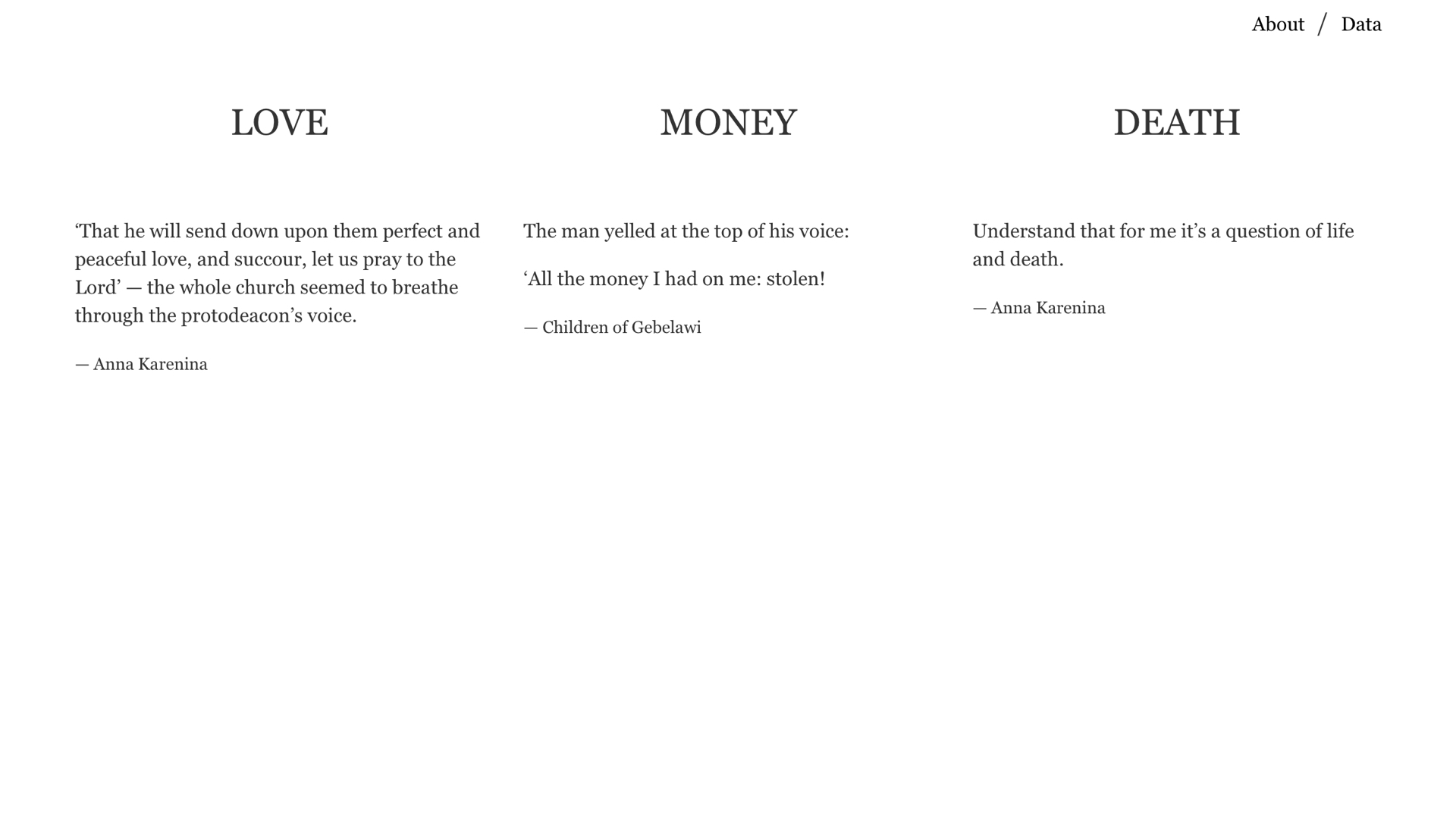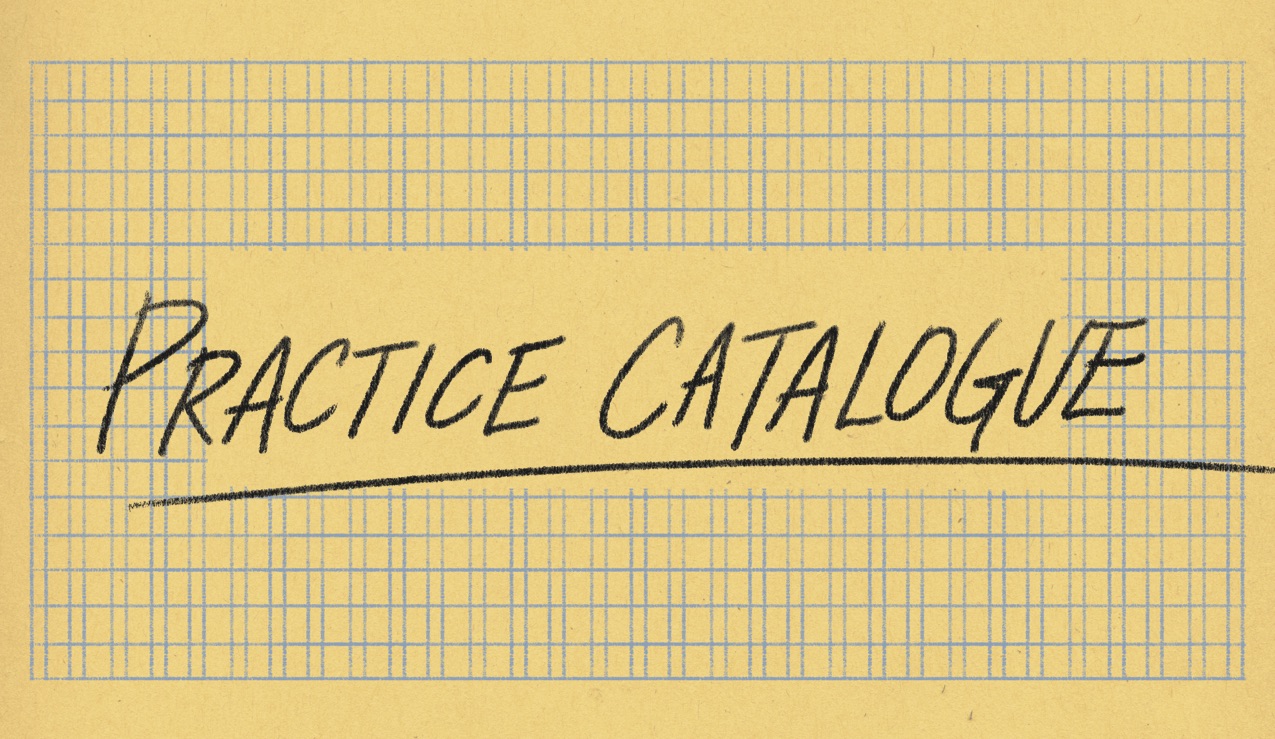Sasha Laing on LOVEMONEYDEATH
 LOVEMONEYDEATH is a collection of every use of the words “love” “money” and “death” in The Best Books of All Time. I collect the words by reading the books, the idea is to actively go through the material––to read the list of books in its entirety. The words (along with the sentence they are used in) are entered into a digital “slot machine” that randomly cycles through the data.
LOVEMONEYDEATH is a collection of every use of the words “love” “money” and “death” in The Best Books of All Time. I collect the words by reading the books, the idea is to actively go through the material––to read the list of books in its entirety. The words (along with the sentence they are used in) are entered into a digital “slot machine” that randomly cycles through the data.
The project grew out of an interest in sorting–in the way we set up systems (narratives, habits, routines, algorithms) to make meaning out of things, and to navigate all the stimulus that the world has to offer.
PC: The other side of a project like this, apart from what it does or makes, is what it’s like to do or undergo. I’m curious how you experience the time spent in the LMD process––how your attention acts on the text, how this compares to reading in the usual way. One could imagine an alternate LMD using computers to search and sort your terms (calling to mind the computational criticism of Franco Moretti). Obviously, by committing to long-term textual hunting with only the onboard human faculties, you’re after something more than just getting the database made.
The project is very selfish in that way. I wanted to set up a system that I would commit to over a long period of time. (The project will take about ten years to complete.) Digitally putting a database together is passive—it’s a way of outsourcing a task. You set up a program and then it runs on its own—it has criteria that it looks for, but it operates thoughtlessly. The activity of manually consuming and digesting a huge volume of material is a key part of the project for me, even if the end result (in terms of the information displayed) is ultimately about the same.
It has changed the way I read—for starters the list chooses what I am going to read for me. Another big change is the re-reading I do while typing out passages to enter into the database. This second reading brings me deeper into how the book was written. It’s amazing how identifiable each sentence is, how connected it is to its author. I’m essentially working with sentences chosen at random, and yet so much of the writer’s voice and themes can be found in almost every excerpt.
PC: Ours is a time more likely to be suspicious than reverent of a catalogue of great works. Still, there’s something indelible in the concept of a canon, which, at least in idealized form, was meant to be a record of the best things thought and said. If “love,” “money,” and “death” label categories of permanent concern, then part of what you’re doing is cycling through a fairly dense aggregation of what ambitious writers have wanted to say about these topics, or at least the way they’ve wanted to use these words. Though I’m bashful to put the question this way, I’m tempted to ask if you experience this work as an acquisition of wisdom (whether in the granular or en masse).
Yes. I wonder if reverence still resonates with contemporary culture. I wanted to put the idea of a canon into a different context—something more playful. I chose a list that was trying in a very earnest way to contain and define “what matters” in literature across history and cultures, and then I gave that list the title “The Best Books of All Time” to poke at that idea at the same time.
And why bashful? I think your phrasing gets at something I want to get at too—because I have the sense there is a general discomfort with sincerely and directly asking something like “what is the meaning of life?” right now. There is a larger shaking up of what it means to acquire wisdom, and how we address in a meaningful way questions about things like truth and morality. Given the hyper-specificity in a lot of our culture, how do we talk about universals?
I really think of LMD as a form of writing, and while the framework is conceptual, the content is also very much meant to be readable and read. I write more traditional fiction as well, and LMD came out of that same process of looking for ways to tell stories. Here, the authorship comes more in the format than in the phrasing, but ultimately I don’t distinguish that much between LMD and say, a short story. It’s all about trying to shape something that feels alive and resonant, and right now, LMD is a format where I am finding that.
